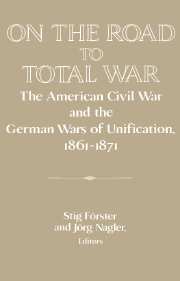Book contents
- Frontmatter
- 1 Introduction
- Part One Basic Questions
- Part Two Nationalism, Leadership, and War
- Part Three Mobilization and Warfare
- 8 The Civil War Armies: Creation, Mobilization, and Development
- 9 African-Americans and the Mobilization for Civil War
- 10 The Civil War Economy: A Modern View
- 11 Industry and Warfare in Prussia
- 12 The Prussian Army from Reform to War
- 13 French Mobilization in 1870
- 14 From Limited War to Total War in America
- 15 Remarks on the Preconditions to Waging War in Prussia-Germany, 1866-71
- Part Four The Home Front
- Part Five The Reality of War
- Part Six The Legacy
- Part Seven Conclusions
- Index
10 - The Civil War Economy: A Modern View
Published online by Cambridge University Press: 05 January 2013
- Frontmatter
- 1 Introduction
- Part One Basic Questions
- Part Two Nationalism, Leadership, and War
- Part Three Mobilization and Warfare
- 8 The Civil War Armies: Creation, Mobilization, and Development
- 9 African-Americans and the Mobilization for Civil War
- 10 The Civil War Economy: A Modern View
- 11 Industry and Warfare in Prussia
- 12 The Prussian Army from Reform to War
- 13 French Mobilization in 1870
- 14 From Limited War to Total War in America
- 15 Remarks on the Preconditions to Waging War in Prussia-Germany, 1866-71
- Part Four The Home Front
- Part Five The Reality of War
- Part Six The Legacy
- Part Seven Conclusions
- Index
Summary
introduction! when is the civil war a total war?
Perhaps more so than any other episode in American history, the main lines of the Civil War story are familiar to Americans. Insofar as todays discussion of total war is concerned, that conventional wisdom proceeds through three logical stages. First, we all recognize that this war was a tremendously destructive war. Second, accounts of the conflict often characterize it as the world s first excursion into total war or modern war, terms sometimes, although not necessarily, used interchangeably. Some approach that conclusion more gingerly, suggesting that this was a transitional war, with one foot in modern, total war and the other in some sort of traditional world. The third stage in this common analysis acknowledges the North as the side most ready to engage in total war. This conclusion builds on the North’s industrial superiority, emphasizing the link between the Industrial Revolution and the global transition to a new kind of warfare. The North was the more modern, industrialized state and thus best prepared to win a total war.
Although this chain of logic makes some sense, it blurs distinctions and can lead to imprecise conclusions. The first point-the Civil War was tremendously destructive - is certainly true. But before we take the next step and locate the Civil War on war s grand evolutionary scale, we should define our terms more clearly. When we do so, we are left with a paradox: The industrial North may have adopted fewer of the trappings of total war than its more agrarian opponent.
- Type
- Chapter
- Information
- On the Road to Total WarThe American Civil War and the German Wars of Unification, 1861–1871, pp. 217 - 248Publisher: Cambridge University PressPrint publication year: 1997
- 5
- Cited by

